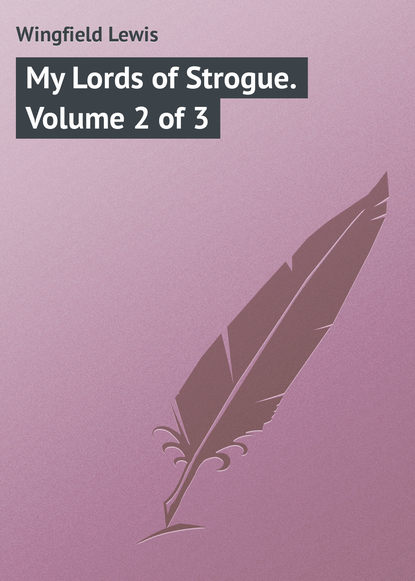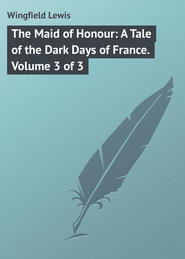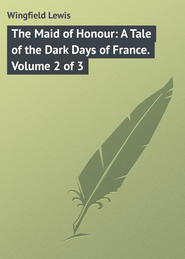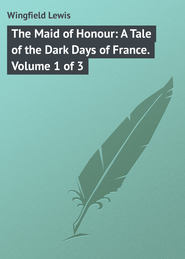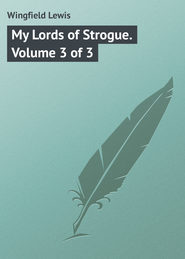По всем вопросам обращайтесь на: info@litportal.ru
(©) 2003-2024.
✖
My Lords of Strogue. Volume 2 of 3
Настройки чтения
Размер шрифта
Высота строк
Поля
'Terence?' Curran replied; 'I've been expecting him every moment.'
'He's not here,' returned Mrs. Gillin. 'His man Phil's below with orders to await his coming. I don't like his getting mixed up in these things. It's not his place, you know. If his mother had a grain of goodness-but there! I can't mention her with patience.'
Curran looked grave, and hurried away to cross-question Phil. It was singular that Terence should not have appeared. The two ladies, between whom there was the bond of a secret, looked each other in the eyes, and temptation was too much for my lady to resist.
'These are indeed dangerous times,' she remarked sweetly to Lady Camden, 'when it behoves us all to do our duty. I beg you will assure his excellency that Glandore will not shrink from his. He can be of little use here where so many have come forward; but he will retire to Donegal as soon as it shall seem needful to watch over his tenants in the interest of Government. And I should not be surprised-but it is a terrible indiscretion-if when things are settled he should bring back with him a bride.'
The stroke went home. Norah turned deadly pale; and Madam Gillin, who had commenced confidences about flannel with a neighbour, found herself suddenly called upon to attend to her daughter, who was fainting. Scarcely had the court circle gathered round the girl, than a new source of commotion became evident in the lobby. High words were being bandied, with a low accompaniment of murmuring. The harsh accents of the chancellor were ringing in remonstrance; Doreen, who, despite her aunt's frowns, had handed her pouncet-box to Madam Gillin, became aware that the other voice was Terence's, raised in unusual indignation. She was quickly carried by the stream to the scene of the disturbance.
Yes; it was Terence, sure enough-in his boots; his hair disordered; a look of menace on his white face; and Lord Clare was striving to bar his passage. Honest Phil behind, firing-iron in hand as usual, stood watching his master's eye.
'Let me pass, my lord!' the young man was saying fiercely. 'An innocent man's life hangs on a thread. I have striven to see his excellency for hours, but have been prevented. He is in his box I know, and I will see him. It cannot be that he knows what's happening! The conscience-stricken jury have repented of their crime, they have made solemn oath that they convicted Orr (God have mercy on them!) when they had been made hopelessly drunk by Major Sirr. Even that's not all. The soldier, too, is afraid of what he's done, and owns that he had a private reason for his malice. Orr will be hanged at dawn unless Lord Camden signs his respite. I'm sure his excellency cannot know what's passing! It's the effect of this horrible one-witness law of yours. Even Caiaphas and his Sanhedrim dared not, in the great judicial murder, to set aside the law which demands at least two witnesses. Even Jezebel suborned two men of Belial to bring about the end of Naboth!'
Perceiving that the throng were in favour of the pleader, Lord Clare strove to draw away the son of his old friend, lest the public should think fit to take an inconvenient part in the discussion-an effort in which he found unexpected help from Curran. The party retreated therefore into an adjoining cloak-room, followed only by a few, while Phil kept doughty guard without, and Lady Camden tried to look as if she were not flustered.
'Oh, that drunkenness should be employed to procure the murder of a man!' Terence cried in agitation. 'If Orr dies, this will be the most savage act which has disgraced even our tribunals. I have striven to believe in the honesty of Government. Let us go together and explain to his excellency while there's yet time!'
The chancellor laid his hand on the young man's shoulder as if to soothe a petulant child; while Curran sat on a table with arms crossed and a sour smile flitting about his lips.
'Young gentleman,' Lord Clare said, 'take the advice of an older man and your mother's friend. Keep aloof from these matters, and don't give credence to grandams' tales. We understand what we are doing, and want no dictation from raw youths-we are satisfied of Orr's guilt. You are keeping bad company, as I warned you once' (with a furtive side-glance at Mr. Curran), 'and will get yourself into trouble!'
Terence's arms dropped to his sides, and he stood thinking. A whispering without could plainly be distinguished through the closed door. He looked for help to his chief, who had spoken out so bravely at the trial, but who now swung his legs in silence.
Presently he sighed, and passing both hands over his face, said slowly: 'Then they were right-I could not, and would not believe it. The lord-lieutenant, then, is a passive instrument in the hands of wicked men-he is made, for a purpose, grossly, inhumanly, to abuse the royal prerogative of mercy, of which the King himself is but a trustee for the benefit of his people. Some of those jurymen were threatened by suborned fellow-jurors-their tottering consciences deadened for awhile by drink; but they have woke to remorse in time. You say this hideous farce may not be stopped! Beware, Lord Clare! Remember to whom you must answer for this man's life! It's true-all true-and I am helpless!'
Lord Clare was provoked. Things were assuming an awkward and unexpected phase. It would not do to have a scandal in the theatre. Suppressing his wrath, he whispered to Mr. Curran before leaving the apartment:
'This boy must not be made a scapegoat. I rely on you to use your influence over him for his family's sake. He has listened to idle gossip, and ardent youth is easily set ablaze. This is most untoward. I will remove their excellencies at once and disappoint those donkeys who are greedily on the look-out for an esclandre.'
His rasping voice was heard presently above the hum in polished periods, deploring that false reports should so easily be credited; explaining that the too sensitive Viceroy must be protected from his own softness, calling for their excellencies' coach without delay.
'Can nothing more be done for Orr? It is too awful!' the junior asked his chief, clinging to his coat with anxious hands.
'If aught could be done, should I have remained silent?' was the dry rejoinder.
Then the lawyer bethought him of his child in the crush, and sallied forth in search of her.
Master Phil, with instinctive respect for a great man, stood aside when the chancellor made his exit, allowing the cloak-room to be flooded with eager inquirers. First entered Cassidy and Doreen, burning to hear news.
Terence roused himself from his reverie, and, clasping a hand of each, muttered in choking words:
'I have fought against conviction long enough. There are limits to an honest man's forbearance. Cassidy! I'll take the oath.'
The giant knitted his brows, and, staring at the cornice, whistled. Doreen darted forth such a golden flash from her cairngorm eyes as flooded the heart of the tempest-tossed young man with a gleam of sunshine.
'Oh, cousin!' he murmured. 'You who are my star! Forgive me for having mistrusted the direction of your guidance! I am easy-going, and not prone to believe evil. But my eyes are opened now. Ireland's soil is sick with the blood of centuries. A little while, and please God she shall bleed no more!'
'Mr. Cassidy!' the girl said, with heaving breast and such a joyous confusion as prevented her from reading the giant's face, 'did I not say to you just now that after darkness comes the morning? Surely night must be at its blackest now, Terence. I take you at your word. This change is a miracle wrought by heaven in the nick of time to prevent Theobald's efforts from being frustrated. I see it, and am grateful. A champion must be tried, you know,' she whispered, smiling, 'and pass through the ordeal which is to prove his faith. I give you yours at once. It is urgently needful that some one should start forthwith for France, to act in concert there with Theobald. Can you make up your mind to this? Yes or no-there is no time for hesitation.'
Terence, a prey still to overmastering agitation, clasped the brown hand that was like a leaf in both of his, while the giant's frown was fixed on one and then the other.
'I told you one day,' the young man whispered, 'that for one reward I would set at naught the traditions of my family. If I succeed in the task which you assign to me-'
A shade passed across the sunlight of Doreen's enthusiasm. How persistently people tried to rehearse love-passages on the floor of the charnel-house!
'Do not let us talk of such things,' she faltered dreamily. 'Mr. Cassidy, you can see the oath administered this evening. Come straight home, Terence-and I'll manage to meet you when the rest are gone to bed. You will have to start betimes, mon preux chevalier; and return as quickly as you may, bearing good news. See to the taking of the oath, Mr. Cassidy, and for once do not make mistakes.'
'I will see to all!' ejaculated the giant, hoarsely; 'though I risk my neck in doing it.'
Another warm pressure of the hand-a lingering look-and Doreen was gone. My lady had harshly summoned her, dismayed at Mr. Curran's recital of the scene, and had bade her don her mantle-wrapt herself in the contemplation of fresh troubles. Madam Gillin, too, had listened to his story, and her round, good-humoured face was drawn out as she listened to inordinate length.
'I can't stand this,' she said by-and-by, to Mr. Curran, as he cloaked her. 'That magnificent dowager who has trundled off in the grand carriage will-as I judge-leave difficulties to unravel themselves. She doesn't like the boy, and would be glad he should come to ruin for reasons buried in her stony heart. But I promised his father to be a guardian angel, and, please God, I will. You must keep him out of mischief-do you hear?'
Keep him out of mischief! Easier said than done; but it was worth trying for. Mr. Curran, unaware of the interchange of sundry tender glances in the cloak-room, did not despair of success. He elbowed in the throng till he met his junior, and bade him be in attendance early at the Four-courts.
'The Four-courts!' scoffed Terence, with lamentable disrespect. 'When justice dies, why dally with her empty robes? I've other fish to fry.'
'Sure it's Misthress Doreen that's been at him,' laughed big Cassidy, with rather forced indifference. 'Who'd be proof against the blarney of the Dhas Astore?'
'Has Miss Wolfe been up to anything? what?' demanded the lawyer, knitting his shaggy eyebrows.
'It's a match they'll be making of it-Lord love the purty pair!' bawled the nettled giant. 'The gintleman's to be complimented who's thus favoured.'
'Is this true?' Curran inquired. 'Has she been persuading you to make a fool of yourself? I turned you out of my house, though I love you like a son, to withdraw you from what might prove a dangerous atmosphere. Maybe I'd better have kept you after all.'
'Perhaps, if I succeed in this mission, she may be mine!' Terence muttered in ecstasy, oblivious for the moment of the fate of the condemned.
'And for such a vague perhaps,' Curran retorted in disgust, 'these goslings will risk their lives!'
CHAPTER II.
DOREEN'S PLANS
It is proverbial that the preaching of the wisest sage may be reckoned as naught in its influence on a young man's fancy when opposed by a siren's smile. Doreen had never, during the years of her sojourn at the Abbey, tried to enlist Terence on the side of her oppressed people. It would have been disloyal to have done so. But now that his long-careless heart had taken the flame of its own accord, it was not likely she should attempt to extinguish it. Having communed with Tom Emmett, she directed her admirer to ride forthwith to Cork, ostensibly on professional business, slip thence with secrecy across the water to see Hoche, and then return with as little delay as might be. He was to tell the French general that ten thousand soldiers were expected-that less than five thousand would be useless-that arms without soldiers would be refused, because a rising would be the immediate consequence of a landing of arms, and it was not thought desirable to turn the attempt, which should be made in force, into a desultory species of Chouannerie. Further, he was to employ all his eloquence to ensure a speedy start, declaring that Erin yearned to break her bonds, that a small nucleus of regular troops was all that was required to start with, as the peasantry were prepared to rise if sure of being properly led.
These orders being succinctly given by a demure girl with rich dark hair and a touching sadness of expression, was it probable that the diatribes of an insignificant little person with shaggy elf-locks and questionable linen should meet with even common courtesy? Curran argued with his junior contrary to his own convictions, striving by forensic imagery to save him from the vortex if he could; declared that nothing but ruin could possibly come of a rising; that the popular cause was hopeless; that the French would possibly make a temporary disturbance to spite perfidious Albion, but that so soon as it should suit their interests, Erin would be blandly restored to the avenger, to reap the reward of her temerity. What sympathy could France have for Ireland? What recked the Directory, or Hoche, or Buonaparte (the clever young general who was becoming celebrated), whether Erin was a slave or not? Other nations as interesting as the Irish were slaves, and would remain so. Just now Hoche was warm upon the subject because he was jealous of Buonaparte and eager for rival laurels. Granted that he were victorious, he would soon weary of what to him must be a worthless and precarious possession, would carry it to market in a treaty of peace, and surrender it to expiate by yet more grinding servitude the false hopes which were born only to perish. But Mr. Curran (who didn't quite believe all this in his heart of hearts) might as well have talked to the trees in his own Priory orchard.
'You'll be dragged farther than you intend,' he urged. 'Your vanity will induce you to take an active part, and then you'll be punished by the revolting slavery entailed by a mob command.'
It was all in vain. Terence went away, and his chief gave out that he had despatched him on business to Cork.
The unfortunate Orr was hanged, and the result quite pleased the chancellor. A thrill of horror ran through all but the most callous. The oath anent the bough was taken by hundreds in desperation. The toast 'Remember Orr!' became a watchword. People shook their heads, wondering what would come of it. Riots grew more frequent, which were suppressed or not according to caprice. Major Sirr's Battalion of Testimony lived on the fat of the land, for there was no difficulty in unearthing traitors, now that the spirit of recklessness had gone forth. Lord Clare pretended to be pained. The ingratitude and wickedness of his countrymen-their hardened fits of daring-made him blush, he vowed. The country was in danger, the yeomanry must bestir themselves, England must send regiments too steady to be undermined; if the people were so disgracefully unruly, martial law would have to be proclaimed. He deeply grieved to suggest such a thing, but the majesty of the executive, whose gravest sin was leniency, must at all hazards be respected.
The capital was quite in a fever, shivering as pigeons do in their cote when they feel the electric current. Every one was looking towards France. Was that armament which was assembling at Brest intended for their coasts? If the fleet were to appear in the offing, how would Government behave? It seemed evident enough how they would behave, for troops kept pouring in from England. Hessians, Highlanders, Englishmen, under command of Lord Carhampton, arrived by shiploads, and, spreading over the counties, were placed at free quarters in the cottages. Dublin and the great towns undertook to look to themselves. The armed squireens, yeomanry, fencibles, strutted in scarlet in the streets, clothed in the bully airs which characterise brief authority.
The burning zeal of Orangeism was let loose in all its excess of wildness, and a fanatical orgy commenced-a saturnalia of fiends who acted in the name of religion-which endured for two whole years. Men, who in the past had made themselves objectionable to Government, were not forgotten now. Even the semblance of moderation was tossed aside. They were delivered to privileged marauders, to be kept under lock and key and ultimately sacrificed in the 'confusion of the times;' whilst as for private enemies, nothing was easier than to charge such an one with treason, and lay him low by purchasing the good offices of an informer. People went openly to the Staghouse, where the 'band of testimony' were kennelled, just as in our modern days they go to Scotland Yard to engage the services of a detective.
In the military mania which revived (how different from the Volunteer movement! the first was an impulse towards good; the latter a carnival of demons), everybody sported a uniform. The Bar chose its special facings, so did the 'prentices, so did the adherents of each opulent grandee. My Lord Powerscourt armed his tenants, but retained them in the hills of Wicklow, declaring that his contingent was not to be made a rabble of aggression. Even the Catholics deemed it prudent to don the red coat in self-defence, as a disguise; and went forth rebel-hunting, sometimes to lay violent hands on their own brethren. But the warriors somehow invariably took the wrong road, or discovered, upon reaching their destination, that gossoons had run forward to give warning. The Right Honourable Claudius Beresford, not to be outdone in zeal, set up a riding-school on Marlborough Green, which later on assumed infamous notoriety as a torture-chamber. Here the yeomen met to try their horses, to accustom them to the sound of drum and clarion, to break a friendly bottle. Dublin assumed the aspect of a garrison; the country of a vast camp.





